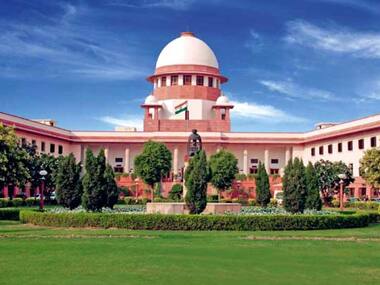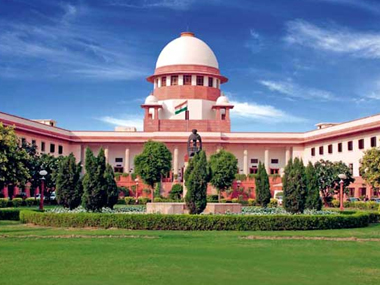by Rakesh Bhatnagar The Supreme Court has scoffed at a provision of the scrapped National Judicial Appointments Act or the 99th constitutional amendment that had been unanimously passed by Parliament and state assemblies. The amendment said that a Commission would be headed by Chief Justice of India and comprise Prime Minister, Law minister, Leader of the Opposition in Lok Sabha of leader of the single largest party like the Congress , besides two “eminent persons” who were to be chosen by the Prime Minister, the Law Minister and the leader of the single largest party in the Lok Sabha. [caption id=“attachment_2471732” align=“alignleft” width=“380”]
 Supreme Court of India. Ibnlive[/caption] Attorney General Mukul Rohatgi had defended this provision saying two “eminent persons” had been included in the NJAC, to infuse inputs which were hitherto not available with the prevailing selection process for appointment of Judges to the higher judiciary. In the same breath he had sought to justify the wisdom of Parliament in introducing the concept of “two eminent persons” who would be “lay persons” having no connection with the judiciary, or even with the profession of advocacy, perhaps individuals who did not even have any law related academic qualification. The constitution bench expressed dissatisfaction with Rohatgi’s contention and said it was “really a submission with all loose ends, and no clear meaning”. Judges have expressed surprise as to what “inputs these eminent persons” would render in the matter of selection and appointment of Judges to the higher judiciary. “The absurdity of including two ‘eminent persons’ on the NJAC can perhaps be appreciated if one were to visualize the participation of such ‘lay persons, in the selection of the Comptroller and Auditor-General, the Chairman and Members of the Finance Commission, the Chairman and Members of the Union Public Service Commission, the Chief Election Commissioner and the Election Commissioners and the like,” the bench of Justices J.S. Khehar, Madan B. Lokur, Kurian Joseph and A.K. Goel said while Justice J. Chelameswar dissented with their views. The inclusion of “lay persons” in the NJAC “would be disastrous”, judges said. “It is imprudent to ape a system prevalent in an advanced country, with an evolved civil society.” “The sensitivity of selecting Judges is so enormous, and the consequences of making inappropriate appointments so dangerous, that if those involved in the process of selection and appointment of Judges to the higher judiciary, make wrongful selections, it may well lead the nation into a chaos of sorts,” the bench warned. Thus, the role of “eminent persons” cannot be appreciated in the manner expressed in the 99th constitutional amendment and the Law. At best, to start with, one or more “eminent persons” (perhaps even a committee of “eminent persons”), could be assigned a role to advice or for consultation in the process of appointment of judges. This could have been done by a committee comprising eminent lawyers, eminent jurists, and even retired Judges, or the like having an “insight to the working and functioning of the judicial system”, but without any conflict of interests, judges suggested. “It is also difficult to appreciate the wisdom of Parliament, to introduce two lay persons, in the process of selection and appointment of Judges to the higher judiciary, and to simultaneously vest with them a power of veto,” the bench held as they took serious note of the major lacuna that a decision could be vetoed by two members. Sections 5(2) and 6(6) of the NJAC Act, clearly mandate, that a person nominated to be considered for appointment as a Judge of the Supreme Court, and persons being considered for appointment as Chief Justices and Judges of High Courts, cannot be appointed, “if any two Members of the NJAC do not agree to the proposal”. Therefore, the two “eminent persons” are sufficiently empowered to reject all recommendations, just by themselves, the bench said highlighting it as a major lacuna in the amended law. Not just that, the two “eminent persons” would also have the absolute authority to reject all names unanimously approved by the remaining four Members of the NJAC. That would obviously include the power to reject, the unanimous recommendation of the entire judicial component of the NJAC. The judges were at a loss to appreciate this provision. “In our considered view, the vesting of such authority in the “eminent persons”, is clearly unsustainable, in the scheme of “independence of the judiciary”’, they said. “Vesting of such authority on persons who have no nexus to the system of administration of justice is clearly arbitrary, and we hold it to be so. The inclusion of “eminent persons would adversely impact primacy of the judiciary, in the matter of selection and appointment of Judges to the higher judiciary (as also their transfer),” the apex court held.
Supreme Court of India. Ibnlive[/caption] Attorney General Mukul Rohatgi had defended this provision saying two “eminent persons” had been included in the NJAC, to infuse inputs which were hitherto not available with the prevailing selection process for appointment of Judges to the higher judiciary. In the same breath he had sought to justify the wisdom of Parliament in introducing the concept of “two eminent persons” who would be “lay persons” having no connection with the judiciary, or even with the profession of advocacy, perhaps individuals who did not even have any law related academic qualification. The constitution bench expressed dissatisfaction with Rohatgi’s contention and said it was “really a submission with all loose ends, and no clear meaning”. Judges have expressed surprise as to what “inputs these eminent persons” would render in the matter of selection and appointment of Judges to the higher judiciary. “The absurdity of including two ‘eminent persons’ on the NJAC can perhaps be appreciated if one were to visualize the participation of such ‘lay persons, in the selection of the Comptroller and Auditor-General, the Chairman and Members of the Finance Commission, the Chairman and Members of the Union Public Service Commission, the Chief Election Commissioner and the Election Commissioners and the like,” the bench of Justices J.S. Khehar, Madan B. Lokur, Kurian Joseph and A.K. Goel said while Justice J. Chelameswar dissented with their views. The inclusion of “lay persons” in the NJAC “would be disastrous”, judges said. “It is imprudent to ape a system prevalent in an advanced country, with an evolved civil society.” “The sensitivity of selecting Judges is so enormous, and the consequences of making inappropriate appointments so dangerous, that if those involved in the process of selection and appointment of Judges to the higher judiciary, make wrongful selections, it may well lead the nation into a chaos of sorts,” the bench warned. Thus, the role of “eminent persons” cannot be appreciated in the manner expressed in the 99th constitutional amendment and the Law. At best, to start with, one or more “eminent persons” (perhaps even a committee of “eminent persons”), could be assigned a role to advice or for consultation in the process of appointment of judges. This could have been done by a committee comprising eminent lawyers, eminent jurists, and even retired Judges, or the like having an “insight to the working and functioning of the judicial system”, but without any conflict of interests, judges suggested. “It is also difficult to appreciate the wisdom of Parliament, to introduce two lay persons, in the process of selection and appointment of Judges to the higher judiciary, and to simultaneously vest with them a power of veto,” the bench held as they took serious note of the major lacuna that a decision could be vetoed by two members. Sections 5(2) and 6(6) of the NJAC Act, clearly mandate, that a person nominated to be considered for appointment as a Judge of the Supreme Court, and persons being considered for appointment as Chief Justices and Judges of High Courts, cannot be appointed, “if any two Members of the NJAC do not agree to the proposal”. Therefore, the two “eminent persons” are sufficiently empowered to reject all recommendations, just by themselves, the bench said highlighting it as a major lacuna in the amended law. Not just that, the two “eminent persons” would also have the absolute authority to reject all names unanimously approved by the remaining four Members of the NJAC. That would obviously include the power to reject, the unanimous recommendation of the entire judicial component of the NJAC. The judges were at a loss to appreciate this provision. “In our considered view, the vesting of such authority in the “eminent persons”, is clearly unsustainable, in the scheme of “independence of the judiciary”’, they said. “Vesting of such authority on persons who have no nexus to the system of administration of justice is clearly arbitrary, and we hold it to be so. The inclusion of “eminent persons would adversely impact primacy of the judiciary, in the matter of selection and appointment of Judges to the higher judiciary (as also their transfer),” the apex court held.
What got the Supreme Court’s goat in NJAC Act: Two eminent persons with power to veto the other four
FP Archives
• October 16, 2015, 18:42:33 IST
Not just that, the two “eminent persons” would also have the absolute authority to reject all names unanimously approved by the remaining four Members of the NJAC. That would obviously include the power to reject, the unanimous recommendation of the entire judicial component of the NJAC. The judges were at a loss to appreciate this provision.
Advertisement
)